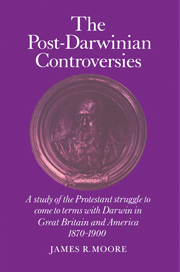 The Post-Darwinian Controversies
The Post-Darwinian Controversies Book contents
- Frontmatter
- Contents
- Dedication
- Preface
- PREFACE TO THE PAPERBACK IMPRESSION
- Introduction: the terrain of revision
- PART I HISTORIANS AND HISTORIOGRAPHY
- 1 Draper, White, and the military metaphor
- 2 Politics, polemics, and the military milieu
- 3 Warfare's toll in historical interpretation
- 4 Towards a non-violent history
- PART II DARWINISM AND EVOLUTIONARY THOUGHT
- PART III THEOLOGY AND EVOLUTION
- Conclusion: on coming to terms with Darwin
- Dedication
- Notes to the text
- Bibliography
- Index
1 - Draper, White, and the military metaphor
Published online by Cambridge University Press: 22 January 2010
- Frontmatter
- Contents
- Dedication
- Preface
- PREFACE TO THE PAPERBACK IMPRESSION
- Introduction: the terrain of revision
- PART I HISTORIANS AND HISTORIOGRAPHY
- 1 Draper, White, and the military metaphor
- 2 Politics, polemics, and the military milieu
- 3 Warfare's toll in historical interpretation
- 4 Towards a non-violent history
- PART II DARWINISM AND EVOLUTIONARY THOUGHT
- PART III THEOLOGY AND EVOLUTION
- Conclusion: on coming to terms with Darwin
- Dedication
- Notes to the text
- Bibliography
- Index
Summary
When historians accept the statement of a partisan as a truth of history they often put themselves at the mercy of a bias which is not their own, the word of a controversialist is received without criticism because it is convenient to do so and not because the historian shares the controversialist's passions; indeed he may never have given much thought about the direction in which those passions might have pulled the statements he accepts.
G.Kitson ClarkClever metaphors die hard. Their tenacity of life approaches that of the hardiest micro-organisms. Living relics litter our language, their raisons d'être forever past, ignored if not forgotten, and their present fascination seldom impaired by the confusions they may create. In politics and religion, where name-calling is at a peak, each generation labels its mugwumps, levellers, quislings, whigs, and tories, its anabaptists, Calvinists, fundamentalists, papists, and puritans. Even a phrase common to Roman history, ‘barbarian assault’, has been widely employed as a slapdash argument for dealing firmly with the lower classes. When once a catchy phrase, a memorable name, or a colourful concept enters the common language, it never fails to make history. In so doing it often takes on a history of its own.
Such is the case of the military metaphor. Through constant repetition in historical and philosophical exposition of every kind, from pulpit, platform, and printed page, the idea of science and religion at ‘war’ has become an integral part of Western intellectual culture. Like other clever metaphors, this one shows few signs of dying out.
- Type
- Chapter
- Information
- The Post-Darwinian ControversiesA Study of the Protestant Struggle to Come to Terms with Darwin in Great Britain and America, 1870-1900, pp. 19 - 49Publisher: Cambridge University PressPrint publication year: 1979
- 4
- Cited by


